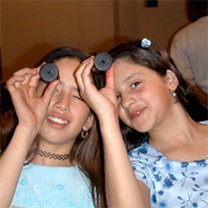 |
Recipient: |
Contact: |
||
Need
The towering dinosaur fossil displays, the realistic cave exhibit, and the interactive simulated volcanoes at the New Mexico Museum of Natural History and Science are catalysts for scientific exploration for adults and children alike. Through these exhibits and related programming, the museum helps visitors understand the rich natural history of New Mexico and the Southwest. Residents of some of the most disadvantaged neighborhoods, however, are frequently missing from the rolls of museum visitorship. In order to extend its mission of promoting science literacy to even the area’s hardest-to-reach residents, the museum established its Proyecto Futuro program.
With some paper, glue, and a pair of scissors a family works together to make a solar system during a family night at the New Mexico Museum of Natural History and Science.
For 10 years the New Mexico Museum of Natural History and Science has maintained its program of outreach to neighborhoods in Albuquerque that are home to many of the newest immigrants from Mexico and South America. Proyecto Futuro involves these families with their children’s education, and it introduces families and teachers to an engaging, hands-on approach to science, helping to cultivate a lifelong interest in discovery and learning. With IMLS funding, the museum extended the successful project to many more families and teachers than ever before.
In addition to learning how to model science activities for their students, teachers receive a 400-page manual during the Proyecto Futuro professional development sessions.
Goals
Through bilingual teacher workshops and museum family nights, the project is designed to involve parents from targeted communities in their children's education, to increase teacher skills and confidence in implementing hands-on science, and to foster positive attitudes toward science learning. Proyecto Futuro helps create a climate in which the children are receiving reinforcing positive messages from both teachers and parents about succeeding and learning science. Through its hands-on demonstrations, Proyecto Futuro helps children and adults alike discover the world of science around them.
Making molecules of toothpicks and candied jellies is just one of the hands-on science activities teachers tested during their day-long professional development sessions.
Strategy
Working with 11 partner schools, the museum offers at its site a series of professional teacher development sessions to bring hands-on science into the classroom and a series of family science nights to bring science learning into the home.
Five teachers are selected at each school to attend the three all-day professional development sessions, where they receive training and bilingual teaching material, including a 400-page manual. The teachers have an opportunity to practice the science demonstrations at the sessions and to exchange ideas with other teachers. Teachers who participate in the Saturday sessions receive stipends to offset the loss of their valuable weekend time.
The six family museum nights held throughout the year bring families to the museum for a simple dinner and two hours of bilingual science activities. The sessions alternate between two formats: one has the families visiting the various activity stations together; the other separates the parents from the children so the two groups can be addressed in a targeted way. At the end of the night, the families each receive a take-home kit so they can follow up with activities at home.
Proyecto Futuro helps to demystify science concepts for families who might otherwise never visit the museum. Through the project a father and his daughter learn to enjoy all the museum has to offer and take away a new sense of curiosity about the world of science around them.
Results
Surveys indicate that parents have enjoyed the workshops and found them useful. They also show that the program has increased parents’ confidence in helping their children with hands-on activities. Many parents have returned to the museum with the free admission tickets they receive as a part of the program or have taken their children to the zoo through its encouragement.
Teachers, too, have benefited from participating. They have more confidence in presenting science in the classroom and have increased the number of science activities they teach each year. The teachers have noted a change in their students’ attitude toward science: they are more inquisitive, ask more questions, have more enthusiasm, and request additional science activities.
The program’s overall popularity is reflected in its high attendance; during the first two years that the project has been funded by IMLS, average attendance has been approximately 700 participants per year. The high attendance has required the project coordinators to add more workshops and think of ways to accommodate the many people interested in participating.
Other organizations have taken note of the program’s successful outcomes. The American Association of Museums’ Standing Professional Committee on Education presented Proyecto Futuro with its 2005 Award for Excellence in Programming.
Science comes to life as families engage in hands-on activities together.
Community Change
Proyecto Futuro has increased awareness in many underserved Albuquerque families of the importance of parental involvement in children’s education. It provides the families with learning opportunities they would not otherwise have. By modeling for families the way to explore science together, the program empowers them to continue the learning experience at home, in school, and at the city’s other learning institutions.